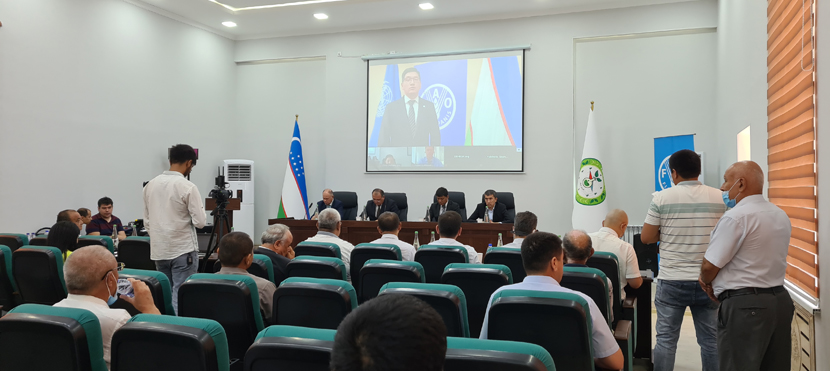
17 June 2021, Tashkent – The FAO Representation in Uzbekistan jointly with the State Forestry Committee of Uzbekistan hosted a conference in the Research Institute of Forestry on the occasion of the World Day to Combat Desertification and Drought. It was attended by participants from relevant ministries and agencies, international and nongovernmental organizations, research institutes. Meeting represented an opportunity for the experts to present their views and thoughts on combat against desertification and drought in Uzbekistan. During the conference a training on agricultural technologies was held for enhancing integrated management of natural resources.
In 1994, the United Nations General Assembly declared 17 June “World Day to Combat Desertification and Drought”. On this date the “United Nations Convention to Combat Desertification in those countries experiencing serious drought and/or desertification, particularly in Africa” was adopted. All UN member states have signed the Convention.
The 2021 Desertification and Drought Day focused on turning degraded lands into healthy ones. Restoring degraded land brings economic resilience, creates jobs, raises incomes and increases food security. It helps biodiversity to recover. It locks away the atmospheric carbon warming the Earth, slowing climate change. It can also lessen the impacts of climate change and underpin a green recovery from the COVID-19 pandemic.
The Central Asian Desert Initiative (CADI) project is being implemented in Uzbekistan since 2017 by FAO and is funded by the government of Germany.
“The initiative aims to promote conservation and sustainable use of the temperate deserts, which are unique ecosystems of global importance. These deserts are important migration areas for birds as well as for wild ungulates. The target countries of CADI are Kazakhstan, Turkmenistan and Uzbekistan. More than half of the territory of Uzbekistan is covered by deserts, which confirms the importance of this project for our country. At this conference, we are pleased to conduct educational training for a wide range of stakeholders and familiarize them with the most effective technologies for integrated natural resource management, including sustainable land management”, – noted Nariman Nishanov, National Coordinator of the CADI project in Uzbekistan.
Another FAO project addressing desertification and drought is entitled “Integrated natural resources management in drought-prone and salt-affected agricultural production landscapes in Central Asia and Turkey” (CACILM-2). Under this project, experts are developing guidelines for managing drought and salinization processes, including on-site demonstration of innovative approaches and technologies to reduce salinity, introduction of new drought-tolerant and salt-tolerant crops, and training for farmers. In Uzbekistan, the project partners are the Ministry of Agriculture, the Ministry of Water Resources, the State Forestry Committee of the Republic of Uzbekistan.
“The overall goal of the project is to scale up integrated natural resource management by introducing sustainable management practices that minimize pressures and negative impacts on natural resources that reduce risks and vulnerability and enhance capacity of rural communities to cope with or adapt to drought and salinity”, – said Mukhammadjon Kosimov, National Manager of the CACILM-2 project in Uzbekistan.
Leave a Reply